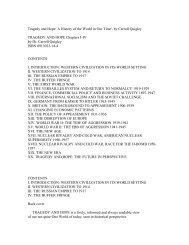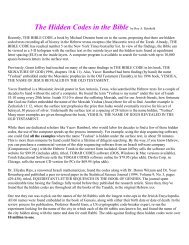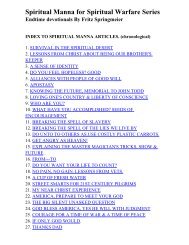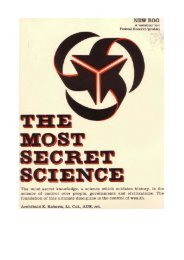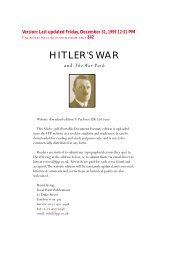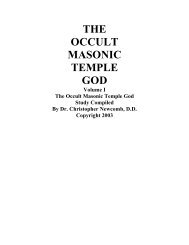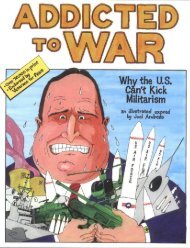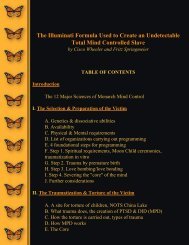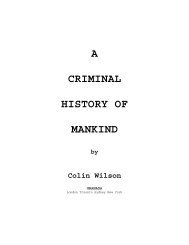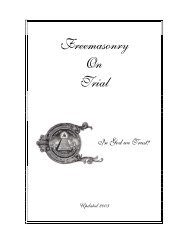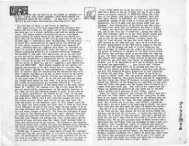An Introduction to the Order of Skull and Bones - vHo
An Introduction to the Order of Skull and Bones - vHo
An Introduction to the Order of Skull and Bones - vHo
- No tags were found...
You also want an ePaper? Increase the reach of your titles
YUMPU automatically turns print PDFs into web optimized ePapers that Google loves.
In 1972, after a stint <strong>of</strong> government service, Bundy <strong>to</strong>ok over Foreign Affairs, <strong>the</strong> most prestigious <strong>and</strong><br />
influential foreign affairs journal in <strong>the</strong> U.S.: <strong>the</strong> bible for policy makers.<br />
So William Bundy is a very influential man. Enough that three aspects <strong>of</strong> his career require fur<strong>the</strong>r<br />
investigation:<br />
• The Hegelian tinge, that a citizen has a duty <strong>to</strong> <strong>the</strong> State,<br />
• The operation <strong>of</strong> <strong>the</strong> Hegelian dialectic <strong>and</strong> whe<strong>the</strong>r any "left" operations can be traced more directly <strong>to</strong><br />
Coving<strong>to</strong>n <strong>and</strong> Burling,<br />
• Whe<strong>the</strong>r Bundy's service in Government shows promotion <strong>of</strong> "right" operations, needed <strong>to</strong> balance <strong>of</strong>f <strong>the</strong><br />
"left" operations.<br />
McGeorge Bundy<br />
Preferential treatment has been accorded McGeorge Bundy all <strong>the</strong> way along <strong>the</strong> line.<br />
Graduating Yale <strong>and</strong> joining The <strong>Order</strong> in 1940, Bundy spent a while at Harvard <strong>and</strong> <strong>the</strong>n joined <strong>the</strong> U.S.<br />
Army "as a private''<br />
Within 12 months Bundy had rocketed <strong>to</strong> captain <strong>and</strong> staff <strong>of</strong>ficer working on Operation Husky (<strong>the</strong> invasion<br />
<strong>of</strong> Sicily) <strong>and</strong> Operation Overlord (<strong>the</strong> invasion <strong>of</strong> Norm<strong>and</strong>y).<br />
If <strong>the</strong>re is one job in this world that requires experience, it must be a staff planning <strong>of</strong>ficer for an amphibious<br />
operation. Only experience can make <strong>the</strong> calculations <strong>of</strong> timing <strong>and</strong> logistics for personnel <strong>and</strong> supplies come<br />
out right. <strong>An</strong>d men's lives depend on this experience. Can a 23-year-old, with no military experience, undertake<br />
planning for amphibious operations The answer is obviously no even if his fa<strong>the</strong>r (The <strong>Order</strong>) is in <strong>the</strong><br />
Pentagon as an aide <strong>to</strong> <strong>the</strong> Secretary <strong>of</strong> War (The <strong>Order</strong>).<br />
The war in Europe finished, Bundy now a veteran <strong>of</strong> 27 years, went straight <strong>to</strong> <strong>the</strong> Pentagon as assistant <strong>to</strong><br />
<strong>the</strong> Secretary <strong>of</strong> War, Henry Stimson. We have already noted Bundy worked on <strong>the</strong> manuscript <strong>of</strong> On Active<br />
Service In Peace <strong>An</strong>d War <strong>and</strong> was rewarded with co-authorship, a definite leg up in his career.<br />
Then, in quick succession, Bundy became consultant <strong>to</strong> <strong>the</strong> Economic Cooperation Administration, although<br />
he presumably knew no more about economics than amphibious l<strong>and</strong>ing, <strong>the</strong>n foreign policy analyst for<br />
Presidential c<strong>and</strong>idate Thomas Dewey, <strong>the</strong>n analyst for <strong>the</strong> Council on Foreign Relations. By 1949 Bundy was<br />
invited <strong>to</strong> Harvard University <strong>and</strong> in four years (1953) was made Dean <strong>of</strong> <strong>the</strong> Faculty <strong>of</strong> Arts <strong>and</strong> Sciences.<br />
We are asked <strong>to</strong> believe that out <strong>of</strong> hundreds, perhaps thous<strong>and</strong>s, <strong>of</strong> experienced academics with decades <strong>of</strong><br />
hard-won credentials, an assistant pr<strong>of</strong>essor - who has been, skipping around <strong>the</strong> non-academic world for ten<br />
years is <strong>the</strong> most talented for <strong>the</strong> post <strong>of</strong> Harvard Dean! We might accept <strong>the</strong> lack <strong>of</strong> experience in amphibious<br />
warfare planning <strong>and</strong> economic programs planning, but Dean <strong>of</strong> a prestigious Harvard department in four years!<br />
No, that's <strong>to</strong>o much. It smells <strong>of</strong> "pull" <strong>and</strong> few readers will dispute that conclusion.<br />
From 1961 <strong>to</strong> 1966 Bundy was Special Assistant for National Security Affairs <strong>to</strong> Presidents Kennedy <strong>and</strong><br />
Johnson. There is a significant aspect <strong>of</strong> this sensitive post which only surfaced under Henry Kissinger. The<br />
post can be used <strong>to</strong> screen information reaching <strong>the</strong> President: in fact, that is one <strong>of</strong> its major purposes, <strong>to</strong> s<strong>to</strong>p<br />
a flood <strong>of</strong> paper reaching <strong>the</strong> Presidential desk.<br />
The o<strong>the</strong>r side <strong>to</strong> this screening process is that it could place <strong>the</strong> President in an artificial information<br />
environment. If <strong>the</strong> options presented <strong>to</strong> <strong>the</strong> President are controlled, so are <strong>the</strong> decisions. Selected information<br />
can control <strong>the</strong> options.<br />
McGeorge Bundy was National Security Adviser in <strong>the</strong> early years <strong>of</strong> <strong>the</strong> Vietnam debacle. While McGeorge<br />
Bundy (The <strong>Order</strong>) was in <strong>the</strong> White House his bro<strong>the</strong>r, William P. Bundy (The <strong>Order</strong>) was in key positions<br />
relating <strong>to</strong> <strong>the</strong> Far East in Defense <strong>and</strong> State Departments. By acting jointly, <strong>the</strong> Bundy bro<strong>the</strong>rs could have<br />
controlled absolutely <strong>the</strong> flow <strong>of</strong> information relating <strong>to</strong> Vietnam from Intelligence, State <strong>and</strong> DOD. We are not<br />
saying this happened. We believe it <strong>to</strong> be a hypo<strong>the</strong>sis worthy <strong>of</strong> examination. As <strong>the</strong>y are blood bro<strong>the</strong>rs in a<br />
secret organization <strong>of</strong> which we know very little - <strong>and</strong> nothing voluntarily - we have reason <strong>to</strong> make this fur<strong>the</strong>r<br />
examination.<br />
In 1966 McGeorge Bundy was appointed President <strong>of</strong> <strong>the</strong> Ford Foundation, a post he retained until 1979.<br />
While at Ford, Bundy brought in as Vice President in charge <strong>of</strong> Education <strong>and</strong> Research Division ano<strong>the</strong>r<br />
member <strong>of</strong> The <strong>Order</strong> - Harold Howe 11,<br />
Howe's qualifications, apart from a Yale undergraduate degree, can be described in Howe's own words:



